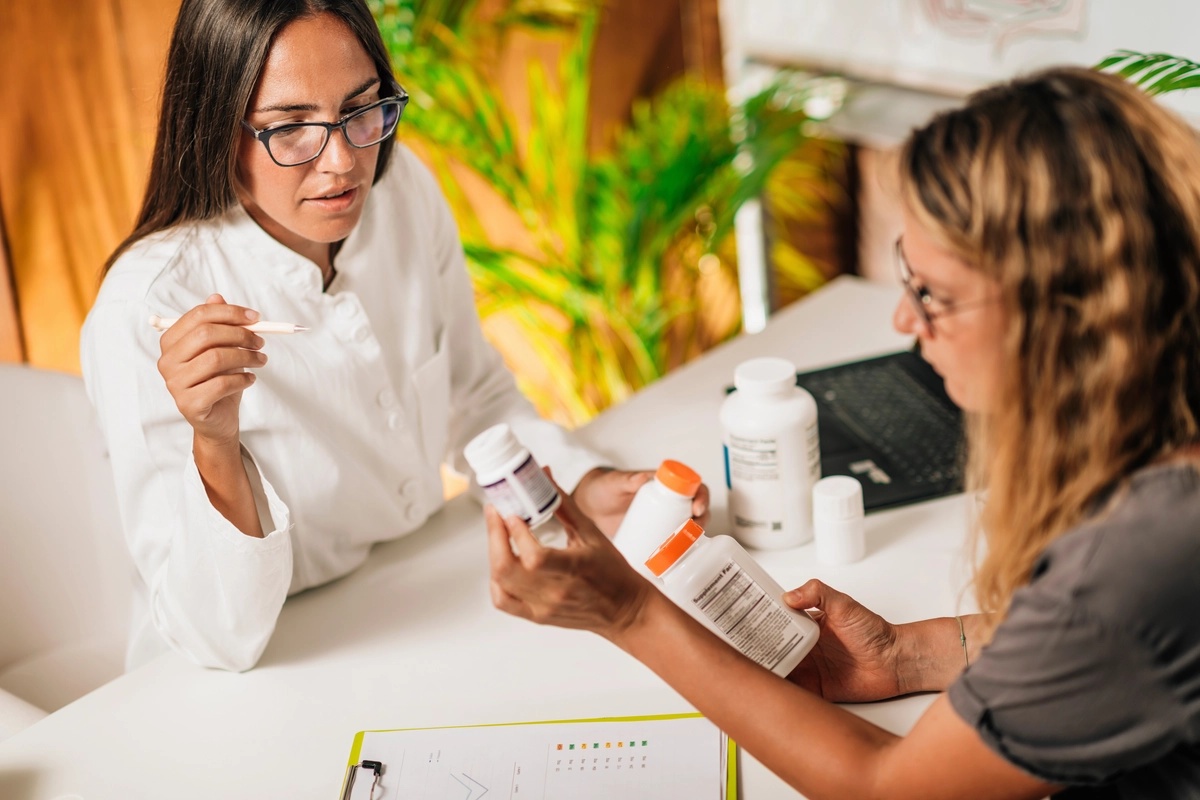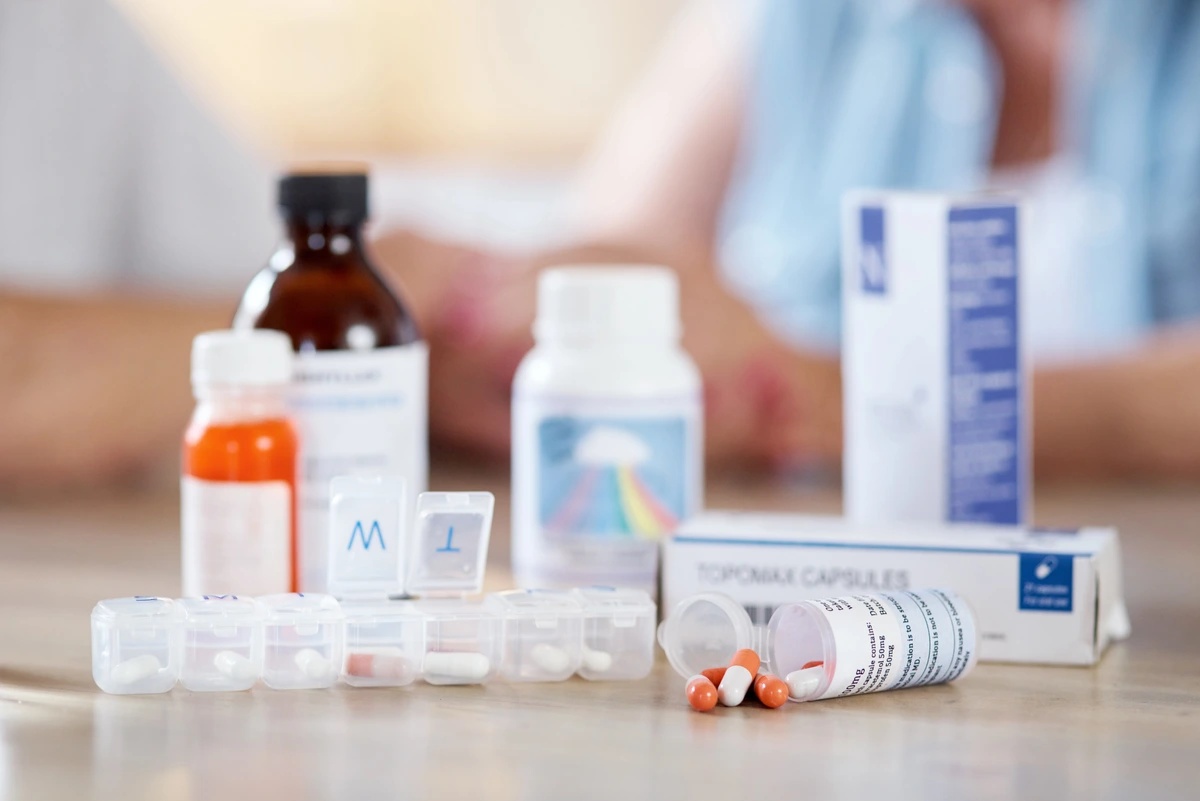MAT: What It Treats, How It Works, & Types of Medications


Medication-assisted treatment (MAT) is a powerful modality for managing and recovering from substance use disorders, mental health conditions, and dual diagnoses. By merging medication with therapy, MAT offers a comprehensive approach to recovery. Learn more about MAT’s potential, and if you or a loved one believe MAT may be the right solution for your struggle, call The Forge Recovery Center today for support.
What Is MAT?
MAT, or Medication-Assisted Treatment, involves the use of medications in combination with counseling and behavioral therapies to provide a comprehensive approach to treating substance use disorders. MAT helps reduce withdrawal symptoms and cravings, making it easier for individuals to focus on their recovery journey effectively.
What Conditions Does MAT Treat?
MAT is most commonly used to treat substance use disorders such as opioid and alcohol addiction, as well as dual diagnoses which present underlying mental health disorders. Here’s a more detailed summary of the conditions MAT primarily treats:
Substance Use Disorders
Medication-assisted treatment (MAT) is a widely used approach to treating substance use disorders by combining behavioral therapy and medications. MAT helps individuals manage withdrawal symptoms, reduce cravings, and prevent relapse. Medications used in MAT can target the brain's receptors affected by drugs, helping to normalize brain chemistry and reduce the pleasurable effects of the substance.
By addressing both the physical and psychological aspects of addiction, MAT increases the chances of successful recovery and long-term sobriety. This approach is particularly effective for opioid use disorder, alcohol use disorder, and other substance dependencies, offering a comprehensive treatment plan that supports individuals in overcoming addiction.
Mental Health & Dual Diagnosis
MAT is also increasingly being used to address mental health disorders, especially in cases of dual diagnosis where individuals have both a substance use disorder and a mental health disorder. It's common for individuals with substance use disorders to struggle with underlying mental health conditions.
In this context, MAT aims to address both the mental health issues and substance use disorders simultaneously. Medications prescribed in MAT can help manage symptoms of mental health conditions like depression or anxiety while also reducing cravings and withdrawal symptoms associated with substance use. Additionally, therapy sessions provide individuals with coping strategies and tools to address underlying issues contributing to both conditions. By integrating medication, therapy, and support services, MAT offers a holistic approach to treating dual diagnosis effectively.

Are You Struggling with Mental Health or Addiction?
We Can Help. Call Us Now!
CALL: 877-839-1772
How Does MAT Work?
MAT combines FDA-approved medications with therapy and behavioral therapies to treat substance use disorders and mental health conditions. Here, we offer a glimpse into the treatment scope and a reminder about your rights as a patient, which are important to keep in mind throughout treatment:
Treatment Scope
MAT aims to provide holistic care by integrating medication with counseling and behavioral therapies. By combining these elements, MAT can effectively address the multifaceted nature of addiction. The medications used in MAT help manage withdrawal symptoms and cravings, allowing individuals to focus on their recovery journey.
Patient Rights
In MAT programs, patients have rights that must be respected. Your autonomy and dignity are paramount throughout the treatment process. Advocacy plays a crucial role in ensuring that your rights are upheld during MAT programs.
As a patient undergoing MAT, you have the right to be informed about your treatment options, participate in decision-making processes, and receive respectful and non-discriminatory care. Upholding patient rights not only promotes ethical healthcare practices but also fosters trust between patients and healthcare providers.
MAT Treatment Goals
MAT has both short- and long-term goals that guide treatment. Short-term goals include stabilizing withdrawal symptoms, for example, while long-term goals are more focused on sustaining long-term sobriety and stability. Here’s a more detailed summary of MAT treatment goals:
Short-Term Goals
When undergoing MAT, your short-term goals primarily focus on stabilizing withdrawal symptoms. This process helps you manage the discomfort associated with stopping substance use. By reducing cravings and preventing relapse, MAT offers immediate benefits to you. These interventions play a crucial role in kick-starting your journey towards long-term recovery.
MAT's short-term objectives involve providing you with the necessary support to navigate the initial challenges of substance withdrawal. The medications used in MAT work to normalize brain chemistry, easing the transition away from substance dependence. By addressing acute symptoms promptly, you can experience relief and a sense of stability during this critical phase.
Long-Term Goals
In the realm of MAT, long-term goals revolve around achieving sustainable outcomes for you in terms of recovery. Through consistent medication management and therapy, MAT aims to support you in maintaining sobriety over an extended period. Ongoing support and monitoring are crucial elements in ensuring the effectiveness of long-term MAT treatment for you.
Long-term MAT treatment is not just about abstaining from substances; it also focuses on enhancing your overall quality of life. By addressing underlying issues contributing to substance use disorders, MAT helps improve various aspects of your well-being. This comprehensive approach considers not only addiction but also mental health, relationships, and daily functioning.
Are You Struggling with Mental Health or Addiction?
We Can Help. Call Us Now!
CALL: 877-839-1772
Why Is MAT Beneficial?
MAT can reduce cravings, ease withdrawal symptoms, and improve the overall quality of life for individuals struggling with SUDs or dual diagnoses. Let’s dive deeper into these benefits:
Reduces Cravings
MAT medications, such as buprenorphine and methadone, target the brain's receptors to diminish cravings for drugs or alcohol. These medications work by blocking the euphoric effects of substances, reducing the desire to use them further. The neurobiological aspect involves restoring balance in neurotransmitters, which helps in curbing the intense urge for substance use. By reducing cravings, MAT plays a crucial role in enhancing treatment adherence and improving overall outcomes.
Eases Withdrawal Symptoms
During detoxification, MAT medications play a vital role in alleviating withdrawal symptoms like nausea, muscle aches, and anxiety. The relief from these discomforts usually begins within hours of taking the medication, providing quick and effective relief during the challenging withdrawal phase. Through regular dosage adjustments under medical supervision, individuals undergoing MAT experience a gradual reduction in withdrawal symptoms, making the detoxification process more manageable.
Improves Overall Quality of Life
MAT not only focuses on addressing addiction but also aims to enhance your overall well-being and functioning. By stabilizing brain chemistry and reducing drug-related behaviors, MAT positively impacts social relationships by promoting healthier interactions with family and friends. Furthermore, by alleviating physical and mental health issues associated with substance abuse, MAT enables you to engage more actively in daily activities, leading to an improved quality of life.

FDA-Approved Medications Used
Medication-assisted treatment uses a set of FDA-approved medications to treat opioid dependence and alcohol addiction. Here’s a rundown of the medications used:
For Opioid Dependence
When it comes to MAT for opioid dependence, you benefit from its proven effectiveness in treating this addiction. The specific medications used in MAT include buprenorphine, methadone, and naltrexone. These medications work by reducing withdrawal symptoms and cravings, helping you on the path to recovery.
MAT plays a crucial role in reducing opioid cravings, making it easier for you to resist the urge to use opioids. By taking these medications as prescribed, you significantly lower the risk of overdose, which is a common concern for individuals struggling with opioid addiction.
For Alcohol Addiction
In addressing alcohol addiction, MAT offers a valuable treatment approach that can support you in overcoming this challenge. The FDA has approved medications such as disulfiram, acamprosate, and naltrexone for MAT in alcohol use disorder. These medications help by altering how your body responds to alcohol, reducing its rewarding effects.
MAT serves as a vital tool in helping you reduce alcohol consumption and maintain sobriety. By incorporating medication into your treatment plan, you increase your chances of preventing relapse and achieving long-term recovery from alcohol addiction.
Are You Struggling with Mental Health or Addiction?
We Can Help. Call Us Now!
CALL: 877-839-1772
Buprenorphine Explained
Usage Guidelines for MAT
When using MAT medications, follow the prescribed dosing schedule to ensure effectiveness. Administer the medication as directed, typically through oral tablets or dissolvable films. Potential side effects include nausea, constipation, and headaches. Adherence to medication and regular monitoring are crucial for successful MAT outcomes.
Your Rights as a Patient
It’s important to understand your rights as a patient in MAT treatment. Your confidentiality and privacy rights are protected by law during MAT sessions. Informed consent is essential before starting any MAT program to ensure you understand the treatment process fully.
Overdose Prevention Strategies
MAT programs involve the use of certain medications, such as Naloxone, to reduce the risk of overdose. The inclusion of naloxone as part of the treatment plan, as well as certain emergency protocols, are in place to safeguard individuals from potential overdose. Here’s an overview of the overdose prevention strategies built into MAT programs:
Naloxone Use
Naloxone plays a crucial role in opioid overdose reversal by rapidly binding to opioid receptors, and reversing respiratory depression. This medication can prevent fatalities by quickly restoring normal breathing in overdose situations.
In MAT programs, naloxone kits are readily accessible to patients and caregivers. These kits contain pre-filled syringes or nasal sprays for easy administration during emergencies. The widespread distribution of naloxone has saved countless lives across various communities.
Training and education on naloxone administration are integral components of MAT programs. Patients and caregivers receive instructions on recognizing overdose symptoms and administering naloxone promptly. This knowledge empowers individuals to act swiftly and effectively during critical situations.
Emergency Protocols
In MAT settings, having clear emergency protocols is essential for managing overdose situations effectively. These protocols outline specific steps to follow when an overdose occurs within the facility, ensuring a timely and coordinated response.
During MAT treatment, it is crucial to be prepared for medical emergencies that may arise unexpectedly. In such cases, immediate action is vital to ensure the safety and well-being of the individual experiencing the emergency.
Rapid response and coordination among staff members are paramount in addressing emergencies in MAT settings. Clear communication, quick decision-making, and adherence to established protocols can significantly impact outcomes, potentially saving lives in critical situations.
Are You Struggling with Mental Health or Addiction?
We Can Help. Call Us Now!
CALL: 877-839-1772
Ensuring Child Safety
If you have a child and are undergoing medication-assisted treatment, it’s crucial to cut off any potential access to MAT medications. This can be accomplished with safe storage methods:
Medication Storage
When it comes to children's safety, it's crucial to store MAT medications properly in your home. Keep them in a locked cabinet or high shelf to prevent easy access. Remember, children are curious and may mistake medications for candy.
Original Containers
To ensure safety, always store MAT medications in their original containers with child-resistant caps intact. Avoid transferring them to other containers that children might mistake for food or drink. When disposing of unused or expired medications, mix them with undesirable substances like coffee grounds or kitty litter before throwing them away.
Expiration Dates & Disposal
Keep a close eye on expiration dates and safely dispose of any expired medications promptly. Remember, even expired medications can be harmful if ingested accidentally by children or pets. Always follow the guidelines for proper disposal provided by local pharmacies or waste management facilities.
MAT Success & Statistics
Success Rates
MAT has shown promising success rates in treating substance use disorders. Research indicates that individuals undergoing MAT have higher chances of achieving long-term recovery compared to those receiving traditional treatments alone.
Studies have shown that the combination of medications and behavioral therapies in MAT significantly improves treatment outcomes, leading to reduced cravings and withdrawal symptoms.
Research Findings
Recent research findings have highlighted the effectiveness of MAT in addressing substance use disorders. Data suggests that individuals engaged in MAT are more likely to remain abstinent from drugs or alcohol over extended periods.
Moreover, research has demonstrated that the combination of medications used in MAT can help restore brain function affected by substance abuse, promoting overall recovery.
Impact on Relapse Rates
MAT plays a crucial role in reducing relapse rates among individuals struggling with substance use disorders. By providing a comprehensive approach that combines medication with counseling and support services, MAT helps individuals manage their addiction effectively.
The positive impact of MAT on reducing relapse rates is evident through various studies showing that individuals enrolled in MAT programs are less likely to experience relapses compared to those undergoing traditional treatments alone.
Quality of Life Improvement
One significant benefit of MAT is its ability to improve the quality of life for individuals battling substance use disorders. By addressing both the physical and psychological aspects of addiction, MAT helps individuals regain control over their lives and rebuild relationships.
Individuals undergoing MAT often report improvements in various areas of their lives, including better mental health, stable employment, and enhanced social connections. This holistic approach not only aids in recovery but also enhances overall well-being.

How to Start Medication Assisted-Treatment
Ready to take the first step toward healing and recovery? MAT starts with an initial assessment, before starting medication selection and treatment planning. Once you’re set for treatment, you’ll likely receive therapies at an inpatient or outpatient care facility. Here’s what you can expect:
Initial Assessment
When starting MAT, the first step is undergoing an initial assessment. This involves discussing your medical history, substance use, and mental health with a healthcare provider. Based on this evaluation, the most suitable treatment plan will be determined. Seeking professional guidance during the initial assessment is crucial as it helps in identifying the most appropriate medication for your specific needs. This step sets the foundation for a successful MAT journey.
Medication Selection
After the initial assessment, the next phase is medication selection. Your healthcare provider will recommend a medication based on factors such as the type of substance use disorder you have and your overall health condition. The medications used in MAT include methadone, buprenorphine, and naltrexone. Each of these medications works differently in managing addiction and preventing withdrawal symptoms.
Treatment Planning
Following medication selection, a comprehensive treatment plan will be developed. This plan outlines the dosage of medication, frequency of appointments, therapy sessions, and other support services that will be part of your treatment journey. Your treatment plan will be tailored to meet your individual needs and goals, ensuring a personalized approach to your recovery through MAT.
Inpatient and Outpatient Settings
MAT can be administered in both inpatient and outpatient settings. In an inpatient setting, you receive treatment while residing at a facility under 24/7 medical supervision. On the other hand, outpatient treatment allows you to visit a clinic for medication management and therapy sessions while living at home. The choice between inpatient and outpatient care depends on various factors such as the severity of your addiction, personal circumstances, and the level of support available to you during treatment.
Importance of Professional Guidance
Embarking on a journey with MAT requires professional guidance and support throughout the process. Healthcare providers specializing in addiction medicine can offer valuable insights, monitor your progress, adjust medications as needed, and provide emotional support along the way.
Closing Thoughts
You've learned about MAT, its benefits, how it works, and the medications used. Understanding MAT's role in treating substance use disorders is crucial. By incorporating FDA-approved medications like buprenorphine, MAT aims for successful outcomes and overdose prevention while ensuring child safety. The statistics show promising results, highlighting the effectiveness of MAT in combating addiction. To begin your journey with medication-assisted treatment, consult a healthcare provider to explore personalized options. Take the first step towards recovery today.
Ready to Start MAT? Contact The Forge Recovery Center Today.
Medication-assisted treatment (MAT) is a recognized solution for substance use disorders, mental health conditions, and dual diagnoses. If you or a loved one are facing any of these struggles, The Forge Recovery Center is here to help. Our skilled team of treatment professionals, trained in MAT, will offer a customized treatment plan suited to your unique needs. Contact us today to learn more about our MAT services and how they can support your path to healing and recovery.



